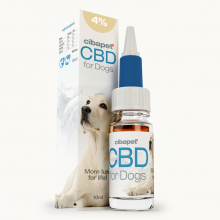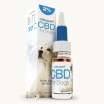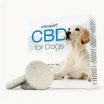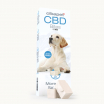CBD Oil for Dogs
Last updated:
Published:
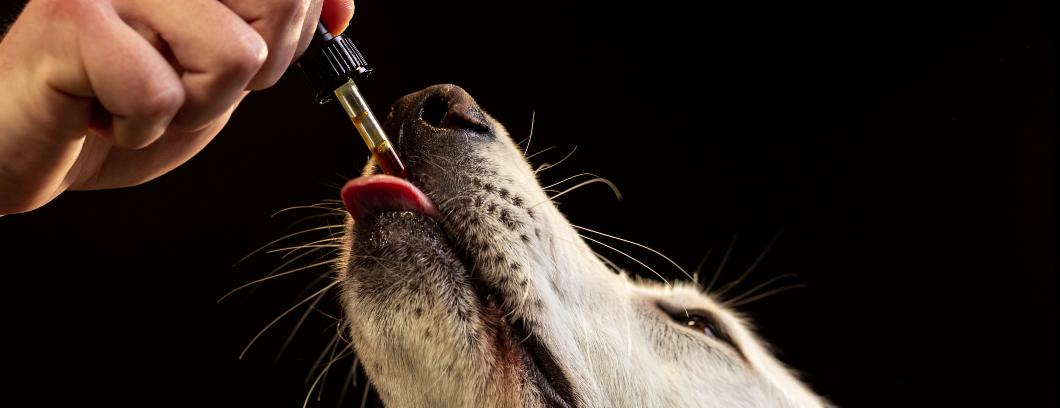
-
The endocannabinoid system of dogs is extremely sensitive and balancing it is essential to your dog’s wellness.
Contents:
- The Canine Endocannabinoid System
- What Are The Benefits?
- Understanding The Risks
- How To Choose Safely
- Finding The Right Dose
- A Partnership In Wellness
- Conclusion
-
Frequently Asked Questions
- Can dogs safely use cannabis products?
- What benefits can cannabis offer for dogs?
- What are the risks of giving dogs cannabis?
- How do I choose a safe cannabis product for my dog?
- How much cannabis product should I give my dog?
- Should I talk to my vet before giving my dog cannabis?
- Are there legal restrictions for using cannabis for dogs?
-
CBD oil could provide many benefits to your dog, such as pain relief, anxiety reduction, joint support, and seizure management.
-
Stick to a low CBD dosage to start, watch your dog closely, and increase accordingly — safety first!
-
Only select premium, lab-tested CBD from trusted brands, and THC and contaminant-free.
-
Keep an eye out for potential side effects and drug interactions and talk to your veterinarian before introducing CBD, particularly if your dog is on other medications.
-
Build a solid relationship with your vet and compliment CBD with a healthy lifestyle for dog wellness .
Cannabis for dogs refers to utilizing cannabis-based compounds, such as CBD, to address typical pet problems including discomfort, anxiety, or mobility challenges. They desire a safe, natural solution to help their dogs get relief without nasty side effects. CBD, from hemp, does not get one stoned and is found in pet oils, treats and creams. THC is not safe for dogs, which is why most pet products use only CBD. Emerging science and anecdotal pet parent evidence indicate CBD is effective for discomfort and the stresses of day-to-day canine life. To find out more about how cannabis products work for pets, the main body will explore the science and safety.
The Canine Endocannabinoid System
Your dog’s endocannabinoid system (ECS) is a sophisticated cell-signaling network that maintains equilibrium across several physiological functions. It occurs in both the central and peripheral nervous systems, as well as in other organs such as the skin, joints, and digestive tract. The ECS is involved in mood, pain, appetite, skin health, and immune response. In canine species, this system is even more sensitive than in humans considering dogs have more cannabinoid receptors, particularly CB1 and CB2. These receptors emerge in a variety of tissues, such as the nervous system, skin, GI tract, and even in pre-natal embryos. For instance, one study discovered CB1 receptors in the eyes, inner ear, thyroid, and olfactory tissues of 30-day-old dog embryos. This broad distribution of receptors is why cannabinoids can exert potent effects in dogs — both positive and negative.
Dogs with skin conditions such as atopic dermatitis demonstrate cannabinoid receptors in their skin and skin appendages. It’s one of the reasons why a few folks turn to cannabinoid products for things like itchy skin or joint pain in their pup! The ECS helps the body adapt and respond to change, maintaining balance. If the ECS is imbalanced, dogs may exhibit stress, pain, or digestive issues. Appropriately-administered cannabinoids can help restore this equilibrium, but dogs’ heightened sensitivity means dosing and product selection are paramount.
Unique cannabinoids engage the ECS in unique manners. For instance, CBD is non-psychoactive and binds to CB1, CB2, and other receptors like GPR55, GPR119, TRPV, and PPAR. Following oral administration of CBD in dogs, the primary metabolite (7-COOH-CBD) is significantly less than in humans at a similar dose. Therefore, this demonstrates that dogs metabolize CBD in a different way. Cannabidiol is metabolized in the liver and present in the urine. Studies indicate doses from 2–20 mg/kg are generally well-tolerated by CBD, displaying mild side effects in the majority of cases.
|
Cannabinoid |
Receptors Targeted |
Psychoactive |
Example Effect in Dogs |
|---|---|---|---|
|
THC |
CB1, CB2 |
Yes |
High sensitivity, risk of toxicity |
|
CBD |
CB1, CB2, GPR55, TRPV, PPAR |
No |
May support calm, comfort, skin |
|
CBG |
CB1, CB2, alpha-2 receptors |
No |
Possible support for inflammation |
|
5-HT1A, COX enzymes |
No |
Possible nausea, inflammation |
ECS balance is bound to a dog’s well-being. Mindful use of cannabinoids, such as those in Cibdol products, can help maintain this equilibrium when used responsibly.
What Are The Benefits?
CBD oil for dogs is still making waves in pet wellness. Research and testimonials indicate among other things, the possibility of tremendous benefits for dogs suffering from pain, anxiety or mobility problems. Cibdol concentrates on delivering safe, pure CBD products to support pet parents with their dog’s health & comfort.
-
Pain relief, including neuropathic pain
-
Reduction of anxious behaviors and stress
-
Support for joint health and mobility
-
Anti-inflammatory effects
-
Help with seizure management
-
Cardiac support
-
Appetite stimulation and anti-nausea effects
-
Relief from itching due to atopy
1. Soothing Anxiety
CBD oil could comfort your dog when he’s going through a difficult moment, like fireworks or thunderstorms. Dogs typically demonstrate stress with excessive barking or hiding. Recognizing these signs assists owners in determining if CBD may benefit their pet.
A consistent CBD regimen can do wonders. Calm targeted CBD chews are convenient, and a lot of owners swear by them for nervous pups. In a study, 83% of dogs were less stressed after using CBD oil.
2. Easing Pain
CBD is a natural pain relief for dogs with old injuries or chronic conditions. It’s great for neuropathic pain and gets arthritic dogs moving once again. CBD’s anti-inflammatory characteristics can provide obvious relief.
It is important to observe how your dog responds and modify the dosage as necessary. Combining CBD with other treatments frequently yields superior outcomes. More than 80% of dogs with osteoarthritis experienced significant relief from pain and increased activity with CBD.
CBD can soothe itching and chewing, assisting dogs with skin allergies. This renders it a general instrument of consolation.
3. Supporting Joints
CBD oil keeps joints healthy — which matters most for breeds prone to hip dysplasia or arthritis. For senior dogs, regular CBD can simplify and provide comfort to their walks. CBD chews for joint health are an easy daily option.
Owners should mix CBD with good food and light exercise. This keeps dogs on the go longer.
4. Promoting Calm
CBD provides calm during stressful events. Hitting the right dose is the trick, as too much can be sedating, but just enough helps dogs chill. Full-spectrum oils incorporate more plant parts for a potent punch.
A peaceful setting helps CBD work even better.
5. Aiding Seizures
CBD looks promising for dogs with seizures/epilepsy. In research, 89% of dogs had less seizures with cbd oil. Owners should always collaborate with a vet to determine the appropriate dose and monitor shifts in seizure patterns.
Extra therapies may help with seizure control.
Understanding The Risks
Dog treats infused with cannabis are an increasingly popular product, but there are genuine dangers associated with their use. Dogs are susceptible to numerous compounds in marijuana, particularly THC, and the absence of defined regulations for pet products can be problematic for safety. Pet owners should not only know the benefits, but the risks and uncertainties before embarking on any cannabis wellness regimen for their dog.
THC Dangers
THC, the element in cannabis that gets you “high,” can be lethal or fatal for dogs. Even minor quantities can result in extreme intoxication, with symptoms such as loss of balance, lethargy and confusion. While CBD is non-psychoactive and doesn’t cause these effects, pet parents need to ensure the products they select are 100 percent THC-free. Human edibles tend to have not only THC but chocolate, sweeteners or raisins – all poisonous to dogs. Always buy lab-tested CBD products, such as those from Cibdol, where THC is marked as “non-detectible.” This also helps mitigate the risk of unintentional THC consumption.
Potential Side-Effects
-
These can include sedation, xerostomia, hypotension or gastrointestinal irritation.
-
Observe your dog closely when beginning CBD, particularly during the initial few days.
-
Begin with a small dose, according to your dog’s weight and response.
-
If you observe side effects that last a few days, contact your vet.
Even in high doses, most side effects of CBD are mild (Vaughn et al.). Each dog responds differently, and the administration of CBD (on an empty stomach or with food) can alter the amount your dog absorbs. Monitoring your dog’s behavior allows you to identify issues before they become severe.
Drug Interactions
CBD may affect how certain other medications work in your dog’s body. This is particularly true if they get treated for pain, seizures, or anxiety. Some drugs might get stronger or weaker and this could harm you.
|
Veterinary Medication |
Possible Interaction with CBD |
|---|---|
|
Phenobarbital (seizures) |
May increase sedation |
|
NSAIDs (pain relief) |
Possible liver enzyme interaction |
|
Antibiotics |
Could change drug absorption |
|
Heart medications |
Potential changes in effectiveness |
Maintain a medicine journal for your dog, and observe any shifts in mood, energy, or appetite when initiating CBD. More research is needed to understand these interactions, so always consult your vet!
Legal and Regulatory Uncertainty
The rules around cannabis for pets are not clear in many countries. This makes it hard to judge product safety or quality, and there is still not enough research to guide best practice. Look for brands that offer transparency and clear lab results, and always ask your vet before starting any new supplement.
How To Choose Safely
Choosing the right cannabis-based CBD oil for your dog is about choosing safely. Not all of them are created equal. Prioritize brands such as Cibdol that appreciate transparency, science, and integrity.
Hemp Source
Hemp is the key for SAFE effective CBD. Make sure the CBD oil is derived from premium organic hemp plants, which provide superior purity and a lower chance of contamination. Organic means no pesticides and no harmful chemicals, which is extremely important to dogs. Opt for items cultivated in regions with rigid farming regulations—Europe, much of North America, and Switzerland are prime examples. These locations are leading the way with strong hemp safety standards. A few brands, such as Cibdol, do list the hemp strain on the label. This information is useful, as certain strains are more effective for animal health. When feasible, opt for locally sourced hemp, both for traceability and to champion environmentally conscious efforts.
Extraction Method
The manner in which CBD is harvested matters. CO2 extraction is the gold standard, used by trusted brands like Cibdol, because it yields pure oil without hazardous residues. Other techniques, such as ethanol extraction, are popular, but if not regulated, they can result in residual byproducts. Brands that provide information on their extraction process demonstrate they’re safety-conscious. Avoid sketchy products or those that don’t specify how the CBD is extracted from the plant. Transparency in the here is a mark of excellence!
Lab Reports
Third-party lab reports provide evidence of what’s in the product. These articles need to verify the CBD content, come back clear of any heavy metals and ensure that the THC is less than 0.3%. Learn to read these reports or request assistance from the retailer. Most credible brands, such as Cibdol, conveniently place these reports online. If the product doesn’t live up to the label, just keep moving. Always choose brands that test every batch and publish results. This helps you steer clear of concealed dangers.
-
Key Criteria for Safe CBD for Dogs: * Organic, premium quality hemp source.
-
CO2 extraction method preferred.
-
Transparent third-party lab reports available.
-
THC under 0.3%
-
No heavy metal contamination.
-
Precise cannabinoid potency.
-
Transparent labeling and dosage.
-
Consult your veterinarian.
-
Keep an eye out for side effects.
-
Emergency contact information offered.
-
Finding The Right Dose
Care and patience is required in identifying the optimal CBD dosage for dogs. Because dogs are all different sizes, weight is the key. As a general guide, begin with 0.2 mg of CBD per pound. For instance, a 5 kg (11 lb) small dog would begin around 2.2 mg of CBD. Others provide a guide of 1–5 mg per 10 lbs (4.5 kg). Cibdol suggests to start low and see how your dog responds.
Low and slow is the surest way. Start low, then increase incrementally until you notice the appropriate effects. Every dog is unique. Others could require more or less CBD, depending on their health or what you’re trying to assist with. It’s okay if you don’t nail it immediately. Dosing is typically a bit of an experiment. A big dog might require a higher starting dose, whereas an older or sensitive dog may need less.
So, always check your CBD oil label. Opt for items that display the CBD content in milligrams per dose. This allows you to deliver the same dose every time and eliminate errors. Administering CBD at the same time every day also assists in maintaining constant levels in your dog’s system. That makes the effects more consistent and simpler to monitor.
Observe your dog’s behavior following each dose. Feelings such as calmness, reduced pain, or increased energy could indicate the dose is correct. Give it 30–40 minutes after administering CBD before expecting change. If you don’t detect any effect after an hour, you can increase the dose slightly. Maintain a minimal journal. Record the dose, the time and your dog’s behavior. For instance, ‘2 mg at 9 am, dog calmer by 10 am.’ This log simplifies identifying patterns and modifying the dose when necessary.
It’s wise to discuss with your vet, particularly if your pup is taking other medications. Finding the right dose is a process, but this cautious, incremental path provides the most likelihood for safe and sustainable success.
A Partnership In Wellness
For dogs, this begins with a strong connection between owners and vets. If you’re considering giving your dog CBD, consult with your vet first. They are familiar with your dog’s health history and can offer guidance on safe dosing, potential interactions, and how CBD may complement other treatments. It’s not just a product to give–it’s a care plan to create for your dog.
Sharing what you see at home lets your vet help you. Sleep, movement or mood changes could indicate if CBD is aiding or if something’s amiss. Keep track of small details: is your dog eating better? Are they less nervous during storms? These real-life notes provide your vet the feedback necessary to tweak the CBD regimen or recommend additional measures.
Wellness for dogs is more than just CBD. A good diet and daily walks count just as much. CBD can aid with certain concerns, such as stress or joint pain, but it’s most effective when incorporated into a larger wellness routine. Try adding omega-3s or probiotics for gut health, or vary exercise routines based on your dog’s age and breed. When mixed together these steps provide your dog the best opportunity at a happy healthy life.
It’s clever to stay on top of new research. The science on CBD and pets continues to expand. While some studies suggest CBD may benefit dogs with pain or anxiety, evidence remains inconsistent. Trusted brands such as Cibdol prioritise safety, quality and transparent labelling. Check trusted sources for news, and consult your vet about new discoveries that might shift your strategy.
Partnerships in wellness can mean championing causes you believe in. Some brands give a portion of sales to animal rescues or other non-profits, creating an even larger impact. These initiatives can range from business tie-ups to individual campaigns. They have a big emphasis on education and transparent information, so you understand exactly what you’re feeding your pup and why. The goal is simple: better health for pets, support for communities, and clear, honest advice every step of the way.
Conclusion
Dogs require nurture and faith and decisive options. Helped by cannabis’ CBD, be it stress, pain or age. Smart science leads to critical benefits but not all products are created equal. Search for lab tests and transparent labels. Collaborate with a vet to identify safe measures and tangible advantages. Opt for brands with transparent information and organic, unadulterated oils.
CBD is not a panacea. Every dog is different. Observe how your dog behaves and feels. Adjust the dose if necessary. Wellness expands by incremental momentum. Curious or need assistance deciding? Contact our team or explore our guides to discover what suits you and your dog best.
Frequently Asked Questions
Can dogs safely use cannabis products?
Only some cannabis products, such as CBD, might be safe for dogs. THC is toxic to dogs. Always check with your vet first before administering your dog cannabis.
What benefits can cannabis offer for dogs?
It’s being noted by some research to be beneficial in the treatment of dogs for pain, anxiety, and inflammation. More research is required. ALWAYS use products designed for pets.
What are the risks of giving dogs cannabis?
Side effects can include lethargy, emesis, and ataxia. THC exposure poses risks. Opt for pet-safe, THC-free products.
How do I choose a safe cannabis product for my dog?
Be sure to choose items that have third-party lab testing and transparent labeling. NO THC PRODUCTS! Opt for labels that focus on pet wellness and ingredient transparency.
How much cannabis product should I give my dog?
Begin with a low dose according to your dog’s weight, as recommended by a vet. Watch your dog’s response and tweak only under expert guidance.
Should I talk to my vet before giving my dog cannabis?
Yes, yes, yes- talk to your veterinarian first. They can advise on safety, dosing, and interactions with other medications your dog might be taking.
Are there legal restrictions for using cannabis for dogs?
Laws differ by country and region. A few locations permit CBD but not THC for pets. Consult local laws before buying or administering any cannabis product for dogs.









